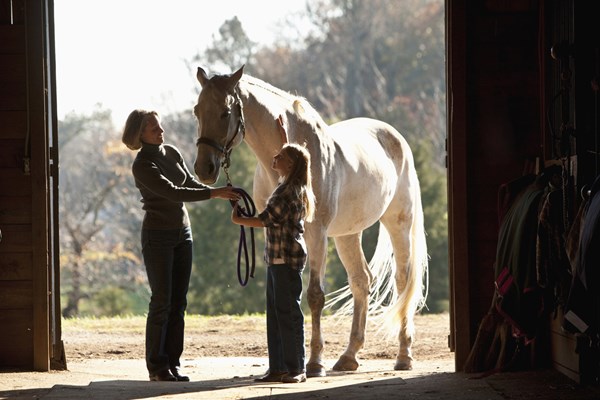 Credit: Thinkstock
Credit: ThinkstockAn older horse experiences a variety of health and body conditions, ranging from too thin to too fat, while some remain in good flesh and good health.
One of the main difficulties in feeding aged horses has to do with a loss of dental efficiency. Sharp points on the edges of the molars make chewing painful. Horses with inconsistent dental care throughout their lives often develop a wave mouth–molar teeth are of differing lengths, making it nearly impossible to chew properly. Also, aged horses tend to have very long incisors, which then blocks contact of the upper and lower molar teeth necessary to grind the feed. Any or a combination of these problems interferes with breakdown of feed to present it to the stomach and intestinal tract for efficient digestion and absorption of nutrients. Coarse particles are irritating to the bowel, resulting in diarrhea. Ineffective digestion of improperly chewed feed components can lead to nutritional deficits, weight loss, and/or poor performance.
Older horses might have difficulty obtaining nutrients because of poor glucose absorption. Such problems can be diagnosed through laboratory testing by your veterinarian. Hormonal changes related to Cushing’s disease also alters nutrient balance in a horse, causing loss of body condition. Chronic pain from musculoskeletal problems may elicit sufficient stress that a horse won’t eat or gain weight. A thorough veterinary physical exam and blood profile screening for other medical conditions and cancer may uncover a reason for weight loss or failure to gain.
Keep track of your horse’s body condition through all seasons by periodically measuring with a weight tape and taking comparative photographs. Feel for fat deposits over the entire horse rather than just his topline. As you run fingers across his thorax, you want to feel just the last two ribs. Close observation of your horse’s changeable physique enables you to continually fine tune dietary needs according to the level of the horse’s activity and in conjunction with weather challenges. If unaffected by disease issues or metabolic conditions, there is no reason a senior horse can’t continue in a robust condition into his later years.
For any age horse, and especially for the aged horse, it is smart to follow basic feeding recommendations for optimal intestinal health:
- Feed at least 60% of the diet in the form of forage, such as hay or pasture.
- Legume hay, high in calcium, is tough on old horse kidneys and is best avoided other than as a supplement.
- Minimize or eliminate grain supplements, using high-fat feed and/or complete feed pellets and/or beet pulp to provide additional calories only when needed.
- Split the daily ration into 3-4 feedings when possible.
- Provide water and salt free choice.
- Offer regular turnout, and exercise on a regular schedule.
Save


